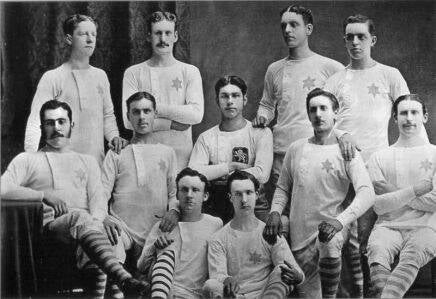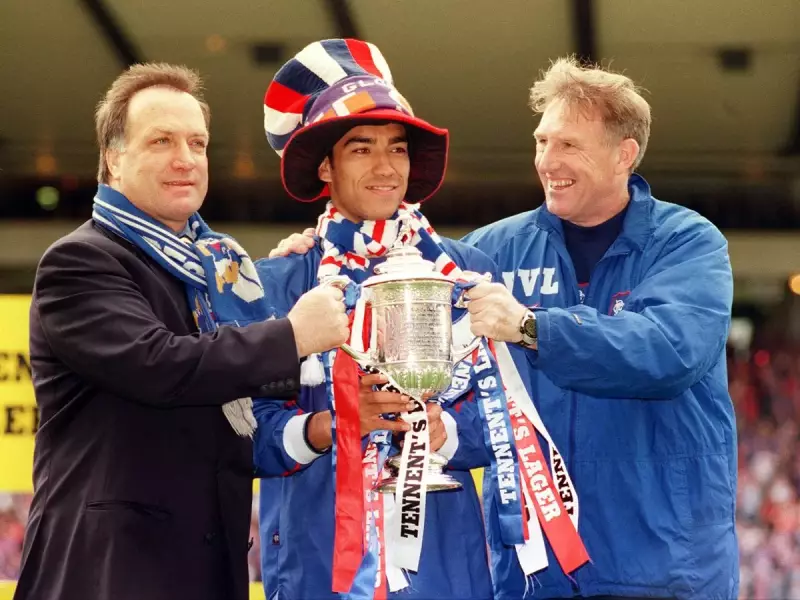History ..


Four Lads Had a Dream ..
Rangers Football Club were founded in March 1872 by brothers Moses and Peter McNeil, Peter Campbell and William McBeath - who met at West End Park. Rangers' first match, in May that year, was a goalless friendly draw with Callandar on Glasgow Green. In 1873, the club held its first annual meeting and staff were elected.
The 1890-91 season saw the inception of the Scottish Football League, and Rangers, by then playing at the first Ibrox Stadium, were one of ten original members. The club's first-ever league match, on 16 August 1890, resulted in a 5–2 victory over Heart of Midlothian. Rangers have played their home matches at Ibrox stadium (formerly known as Ibrox Park) since 1899 - tragedy would strike at the ground on April 5, 1902 when a stand collapsed during a Scotland v England game, leading to the deaths of 25 supporters and injuring over 500.
Bill Struth and Scot Symon ..
Taking over as manager after William Wilton's death in 1920, Bill Struth remains Rangers' most successful manager ever, guiding the club to 14 league titles before the onset of World War Two. On the 2nd of January 1939 a British league attendance record was broken as 118,567 fans turned out to watch Rangers beat Celtic at Ibrox on New Year's Day.
Struth remains the most successful manager in Scottish football history having won ten league championships, ten Scottish cups and two league cups between 1920 to 1954.
Scot Symon took over from Struth in 1954 and would manage the club for 13 years. Symon went on to win six league championships, five Scottish cups and four league cups in his time at the club. Rangers also reached the semi-finals of the European Cup in 1960 as well as reaching the final of the Cup Winners' Cup in 1961, becoming the first British team to reach a European final - they would reach the final again in 1967, however they lost on both occasions.
Ibrox stadium disaster and European Glory ..
The second Ibrox stadium disaster occurred at an Old Firm match on January 2, 1971 resulting in the tragic deaths of 66 Rangers supporters and also left over 200 people injured, as a result of large-scale crushing on a stairway exit.
This was subsequently followed by European success in 1972 with the club winning the Cup Winners Cup after beating Dynamo Moscow 3-2 in Barcelona, under the management of Willie Waddell.
Following a decade of Celtic domination under Jock Stein, legendary manager Jock Wallace led Rangers to their first league title in 11 years in the 1974-75 season and would go on to win the domestic treble the following year, a feat they would repeat again in 1977-78.
John Greig served as manager of Rangers for five years but was unable to replicate the success as manager he had enjoyed as a player - unable to win the league during his reign, he was replaced by Wallace returning in 1983, however Wallace was unable to repeat the success from his first spell in charge and would be replaced by Graeme Souness in 1986.
Souness, Smith and 9-in-a-row ..
Graeme Souness became player-manager in 1986 with Walter Smith as his assistant. Rangers would go on to equal Celtic's 9-in-a-row success by winning the league championship every season from 1988-89 to 1996-97, with Graeme Souness winning three titles and the latter six being won under the management of Walter Smith. Rangers secured their ninth consecutive league title with victory at Tannadice Park against Dundee United on May 7, 1997.
Rangers also won five Scottish Cups and six Scottish League Cups during this period. Smith is the second most successful manager in Rangers' history after Bill Struth. Some notable Rangers players from this era include Ally McCoist, Mark Hateley, Richard Gough, Terry Butcher, Paul Gasgoigne, Brian Laudrup, Andy Goram and Davie Cooper.
Advocat, McLeish and Le Guen; Walter Smith's return ..
Dutchman Dick Advocat became the first foreign manager in the club's history when he was appointed to replace Walter Smith in 1998. Rangers spent heavily in rebuilding the team and would win the domestic treble in the 1998-99 season, securing the league championship with a 3-0 victory over their bitter rivals at Celtic Park on May 2, 1999.
Rangers went on to win the league title in 1999-2000 by a record margin of 21 points ahead of Celtic - they would also win the Scottish Cup securing a domestic double.
Advocat would however struggle in his third season against Martin O'Neil's Celtic side and success in Europe continued to allude Rangers. Advocat resigned as Rangers manager in December 2001 and was replaced by Alex McLeish, following a difficult start to the 2001-02 season.
McLeish won the domestic treble in 2002-03, his first full season in charge at Ibrox, becoming the sixth Rangers manager in history to do so. The league title was won on the final day of the season on goal difference with an emphatic 6-1 win over Dunfermline Athletic at Ibrox. In doing so Rangers became the first club in world football to secure 50 domestic titles.
Rangers failed to win any silverware the following season and 2004/05 would see a rebuild with the arrival of Nacho Novo, Dado Prso, Jean-Alain Boumsong and the return of former club captain Barry Ferguson. McLeish's side would regain the league title from Celtic with victory at Easter Road in another dramatic final day showdown.
Despite reaching the last 16 of the Champions League in 2005-06, Rangers struggled domestically which included a club-record run of 10 consecutive games without a win. Chairman David Murray announced that McLeish was stepping down at the end of the season and would be replaced by Frenchman Paul Le Guen.
Le Guen's side performed well in the UEFA Cup, reaching the last 32 after ending the group stage unbeaten, however domestic struggles and claims of friction between Le Guen and captain Barry Ferguson would prove to be his downfall and the Frenchman would depart the club by mutual consent in January 2007 - paving the way for the return of Walter Smith as Rangers manager after resigning as head of the Scotland national team.
Smith would guide Rangers to three SPL titles, two Scottish Cups and three League Cups in his second spell in charge at Ibrox - Rangers also reached the final of the UEFA Cup in 2007/08, losing the final in Manchester to Russian side Zenit Saint Petersburg after a sensational run which saw them overcome the likes of Werder Bremen, Sporting Lisbon and Fiorentina.
Financial Woes and Liquidation ..
Walter Smith retired at the end of the 2010-11 season and was replaced by his assistant and club-record goalscorer Ally McCoist for the 2011-12 campaign. It proved to be a tough start for McCoist with exits from both the Champions League and Europa League early in the season and despite a promising start in the league Rangers went out of both cup competitions. Rangers' title aspirations were also brought to an abrupt end in February 2012 when the club entered administration and were deducted 10 points, effectively handing the title to rivals Celtic.
In June 2012 Rangers entered the process of liquidation and the club's business and assets, including Ibrox stadium were bought by a new company, Sevco Scotland Ltd, who later changed their name to The Rangers Football Club Ltd.
Rangers were accepted into the Scottish Third Division in time for the start of the 2012-13 season - 49,118 supporters would watch Rangers defeat East Stirlingshire 5-1 at Ibrox in their opening match - a world record attendance for a fourth-tier football game. Rangers won the Third Division comfortably as well as the Scottish League One Title in 2013-14, however the Scottish Championship would prove a much tougher challenge as Rangers found themselves competing for promotion against Edinburgh clubs Hearts and Hibernian and ultimately lost the play-off final to Premiership side Motherwell.
Mark Warburton was appointed as manager in June 2015 and Rangers went on to win the 2015-16 Scottish Championship, thus gaining promotion back to Scotland's top flight for the 2016-17 season. Rangers also reached the final of the Scottish Cup in 2016, beating Celtic in the semi-final on penalties before losing the final to Hibernian.
Top flight return - Warburton, Caixinha and Murty ..
Following a poor first half of the 2016-17 campaign, Warburton and his assistant David Weir departed the club in February 2017, with Graeme Murty taking interim charge before Pedro Caixinha was appointed as permanent manager. The Portuguese manager's reign would however be short-lived with Rangers suffering one of their most embarrassing defeats in their history, losing to Luxembourg side Progrès Niederkorn 2-1 on aggregate in their 2017-18 Europa League qualifying first round tie. Things didn't get much better domestically either and after a string poor results Caixinha was sacked, with Graeme Murty once again taking on the role of interim manager.
After an impressive run of results Murty was given the interim job until the end of the season however he would be dismissed on May 1 2018, following a 5-0 hammering at the hands of Celtic as they secured their 7th consecutive Premiership title. Rangers would end the season in third place for the second season running, behind Celtic and Aberdeen.
Steven Gerrard ..
Graeme Murty would be replaced by former Liverpool and England captain Steven Gerrard in May 2018 with the Englishman agreeing a four-year deal to become Rangers manager. The season started well as the Light Blues went their first 12 games of the campaign unbeaten, qualifying for the Europa League group stage in the process. Despite victory over Celtic in the Scottish Cup Gerrard's men would ultimately end the season trophy-less and second in the league table.
The 2019-20 season would also end without silverware after a 1-0 defeat to Celtic in the League Cup final, despite a dominant Rangers display at Hampden. All professional football was suspended in March 2020 due to the Covid-19 pandemic; Celtic were declared champions in May 2020 as the SPFL season was officially brought to a close, having led the league by 13 points.
The 2020-21 season would see Rangers become champions of Scotland for the first time in 10 years with Gerrard's side ending the season unbeaten in the Scottish Premiership, 25 points clear of second-place Celtic and with a club-record tally of 102 points, preventing their bitter rivals from winning an unprecedented 10 in-a-row.
Van Bronckhorst, Beale and Clement ..
Gerrard left Ibrox to become manager of Premier League side Aston Villa a few months into the 2021-22 season and was replaced by former Rangers defender Giovanni van Bronckhorst.
Celtic would regain the Scottish Premiership title by four points, however van Bronckhorst guided the Light Blues to the final of the UEFA Europa League - losing on penalties to Eintracht Frankfurt.
The Dutchman would lead his team to silverware three days later though, with Rangers beating Hearts 2-0 in the Scottish Cup final at Hampden.



